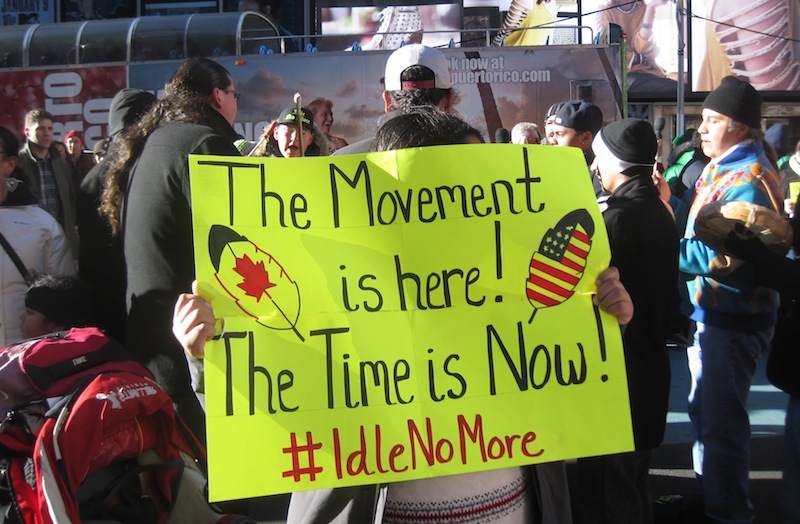Change the conversation, support rabble.ca today.
Imagine a country where the national government introduces and passes legislation that detrimentally affects all of its First Nations communities but it doesn’t bother to consult with them. Then a chief of an impoverished northern First Nation community goes on a hunger strike to get a meeting between the First Nations leadership and the government several months after this legislation was passed. Does this have implications for all Canadians? You bet it does. This will not be the last time that individuals or groups will take such extreme measures in response to the federal government’s public policy process or lack thereof.
All Canadians owe a debt of gratitude to Chief Theresa Spence’s and Elder Raymond Robinson’s hunger strikes. These individuals are calling attention to an intolerable situation among First Nations communities. They are also highlighting concerns common to many Canadians about dangers posed by unilateral government actions to the natural environment and the state of our democracy.
The hunger strike has galvanized widespread protests by youthful and energetic supporters of the Idle No More movement. These are all predictable responses to a government that routinely bullies anyone who does not agree with it, refuses to consult, and prefers ideology over evidence when developing and implementing public policy.
Of major concern to First Nations and many other Canadians are two omnibus budget bills (C-38 and C-45) that were imposed upon the country during the past year. These bills each comprised hundreds of pages and contained legislative changes that went far beyond what was contained in the budget.
The omnibus bills will have an especially damaging impact on First Nations communities. Bill C-45 amends the Navigable Waters Protection Act to ensure that future resource projects will no longer trigger a federal environmental assessment or force corporations to notify the federal government of their plans. Certain key rivers in British Columbia, along the path of the proposed Northern Gateway pipeline, for example, will now be excluded from federal government environmental oversight.
This same bill also changed the Fisheries Act in ways that First Nations believe will adversely affect their traditional fishing rights. The omnibus bills also replaced the Canadian Environmental Assessment Act with new laws that will limit First Nations involvement in environmental assessments on their own lands, as well as doing away with assessments entirely for some projects. All of this will limit the ability of First Nations, and the public at large, to present views and concerns on the environmental impact of various resource development projects.
Bill C-45 also makes changes to the Indian Act that will make it easier to lease out land for economic development without adequately consulting band residents. The Assembly of First Nations believes this means resource exploitation on reserve land can occur without the solid consent of their community.
The government acted in a similarly high-handed way when, without any consultation, it used Bill C-38 to raise the age from 65 to 67 at which Canadians are eligible for the Old Age Security and the Guaranteed Income Supplement. When this change is implemented, its greatest negative effects will be felt by the most vulnerable workers. Those who have toiled for low wages, often in the most physically demanding jobs, will be forced to work for two extra years before receiving old age security benefits. This happened despite overwhelming evidence from experts across the political spectrum that this change was unnecessary.
Here is the problem. This government drafts public policy and passes laws without facts or evidence to support its positions. Ottawa allows only limited and perfunctory consultation for stakeholders. If you stand up and speak out, you are criticized and attacked in the House of Commons and the Conservative public relations machine goes into overdrive to discredit your position or organization. If you are a recipient of federal government funding, you lose it by the next budget cycle. It’s bully American-style politics at its worst.
Many Canadians are deeply ashamed of the persistence of poverty and deplorable living conditions in First Nations communities, and that we still have not settled land claims with them. Many also share First Nations’ concerns about the environmental implications of changes to fisheries, environmental assessments, and water protection.
The hunger strike by Chief Spence and actions undertaken by the Idle No More movement have resonated with Canadians. National Chief Shawn Atleo has arranged for a crucial meeting with Prime Minister Stephen Harper to discuss urgent issues that cannot wait. We salute individuals and the movement that have created the conditions to force this conversation to occur. It is completely un-Canadian and a national disgrace that it took a hunger strike and national protests to create an opportunity for dialogue and input that should have happened in the first place.
The real shame is how little Canadians expect of their national government and how disengaged and unaffected they feel about politics at the national level. It is only a matter of time before Canadians realize that this government serves only the interests of a few. Citizens will begin to contemplate individual and collective responses and actions to change this situation.
Decisions that leave people behind force them into the streets. This was true of the Occupy movement and the Quebec students’ protest, and now we are seeing it with Idle No More. It is likely Canadians will witness more in the future given this government’s tendency to make substantive policy changes that alter the fabric of society without consultation.
Maude Barlow is National Chairperson of the Council of Canadians. Ken Georgetti is president of the 3.3 million member Canadian Labour Congress.



